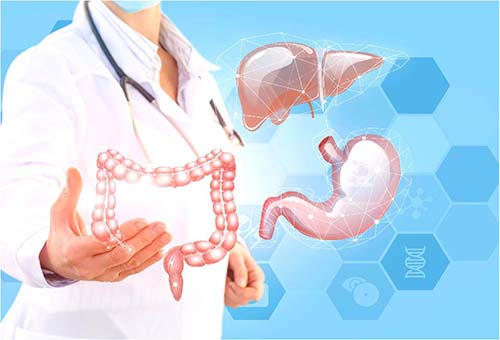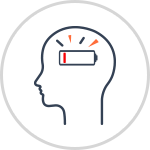
Digestive system, “leaky gut”, disadvantage of overall health
When mentioning a disease that relates with the digestive system from the perspective of ordinary people, we often think about the “intestine” and diseases like gastric disorders, inflammation, diarrhea, appendicitis, colon cancer, or hepatitis. From these diseases, we can see that our digestive system is large, but what most people don’t know is the “intestine” can cause many diseases that occur to our body.

Overall, it’s clear that the intestines are part of the complete digestive system. If they are problems in any point, problems of the digestive system might occur. However, the deeper truth is that problems with the function of intestine is connected with the immune system, neurotransmitters, and gene expression as follows:
-
Disturbances of (immunity) because the intestine is weak due to large amounts of lymphatic tissue in the intestine. The intestine is considered to be the largest organ with a length of 8 meters. Under this length, there are a lot of sub-tissues to increase the surface area for digestion and surface area for absorption. To make a simple comparison, if we unfold the tissue into thin sheet like A4 paper, the surface area of the entire gastrointestinal mucosa of people would be the size of half a football field. If we lift these tissues up, you will find many lymphatic tissues.
Therefore, if the gastrointestinal mucosa is not strong, there will be irritation, degeneration, or wounds that will cause small leak holes or Leaky Gut Syndrome. These leak holes will cause the toxins in the intestine to enter the body. For example: Poorly digested food will affect the immune system that destroys disease. It will be stimulated and followed by the inflammation process. If the inflammation becomes more serious until the body cannot withstand the inflammation by itself, many symptoms will occur. The characteristics of expressed symptoms depend on the organ position of the inflammation. For example: If the inflammation occurs at the eyes, there will be eye irritation. If the inflammation occurs at the skin, it will cause rashes or several problems in all systems at the same time and become Autoimmune Disease.

So, we must consider the causes that weaken the gastrointestinal mucosa, such as, eating fast, swallowing fast, unchewed food, improper food consumption with the digestive system of the body, regularly taking antibiotics or painkillers, preservatives, and other toxins, in order to find the treatment for the cause.
-
Impact of (neurotransmitters) and the intestinal mucosa are stimulated. It is found that when the intestinal mucosa is stimulated from the nerve system automatically, it will affect the synthesis of serotonin. Serotonin is the neurotransmitter that activates with the brain. However, in the human body, the most creation of serotonin is found in the intestinal mucosa. The advantages of serotonin are it helps people to be happy and sleep well. Also, it relates with the synthesis of melatonin, which helps you to have a deep sleep. Therefore, if the intestine mucosa is weak with a disturbed intestine, it will cause emotional disability, depression, and bad sleep. If it happens for a long time, it will cause poor short-term memory and lead to Attention Deficit Hyperactivity Disorder. Therefore, the health of the intestine has a greater impact than stomachaches and constipation. It can be said that it is the beginning of many symptoms. From the importance of the intestine, UCLA of United States of America has stated that the “intestine” is the 2nd human brain.
-
Intestine problem is connected with (gene expression). In the human body, we have DNA as the storage of the genetics with genetic dissimilarity because ATCG is the determinant for the genetic characteristics, such as hair color and appearance, including health, metabolic system, brain, and immune system. Therefore, there was a study to decode ATCG and it was found that Epigenetics works to turn on and turn off the gene function. One of the most important keys of Epigenetics is MicroRNA which comes from the bacteria in the intestinal bacteria. The characteristic of each food will affect the synthesis of MicroRNA of intestinal bacteria differently, which affects the difference in turning on and turning off the gene. Therefore, if the body has a cancer gene and you do not take care of the food that might relate with the bacteria that affects the cancer, which is a bad bacteria, it will affect the creation of bad protein and lead to the opening of the cancer gene.

Tips to keep the intestine strong consist of 5 factors as follows:
-
Proper food, which are
-
Types of food that are suitable for the body We will know whether the food is suitable or unsuitable for us by taking the Food Intolerance Test to find out which foods you are allergic to and which food that you can have.
-
How to eat all the food that you take Chew for 30 seconds/bite. Do not hurry to chew or swallow.
-
Meal The nature of our body is built to create hormones in the morning for energy. These hormones are thyroid, adrenal gland, and sex hormones. In order to produce the hormones, the precursors are needed. For example: Fatty acids, amino acids, minerals, and vitamins. Therefore, if we do not have breakfast, the cells will not receive nutrients. The body will not be able to produce the hormones fully. The metabolic system and digestive system will become bad. Therefore, breakfast is very important. We should eat breakfast to obtain the full nutrients. As for other meals, you can eat as appropriate.
-
Mood-Brightening, because the mood is important to the response of the automated nerve system. The digestive system still relies on Parasympathetic system, which is clearly shown that when the digestive system is good and effective, the body is relaxed. On the other hand, if you are stressed, you will not feel hungry because the intestine will not contract and the digestive system is poor. A lot of acid will be produced, which will cause ulcers in the stomach. Also, if you are stressed, the blood sugar will become higher to serve as energy for the stress, which will make the pancreas work hard in order to produce the insulin to reduce the stress level. Meanwhile, the pancreas does not only produce the insulin, it also produces enzymes to digest well. Therefore, when you are stressed, the pancreas will not be able to produce enzymes to digest food fully.
-
Exercise regularly to stimulate the metabolism because when the body walks or runs, the intestine will have movement. The intestine will contract and work systematically.
-
Sleep early for the liver to detoxify and balance the hormones in the body properly.
-
Detoxify the toxins from the body because the current raw materials and cooking methods are full of toxins. Therefore, detoxification is important and should be done in several ways, starting from adjusting your diet, using vegetable water to detoxify, detoxifying the liver, and detoxifying the intestine, including taking heavy metals out of the body to balance the intestine strong again.

“Intestine”, the 2nd human brain, is like the beginning of chronic diseases and the degeneration of the body....Therefore, you should pay more attention and take better care of the intestine...



























Sign In
Create New Account